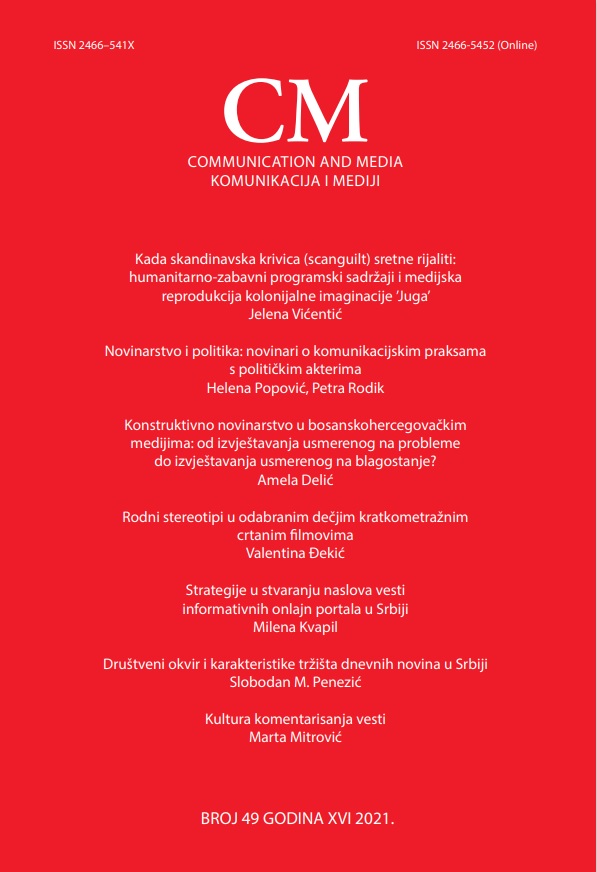JOURNALISM AND POLITICS: JOURNALISTS ON COMMUNICATION PRACTICES WITH POLITICAL ACTORS
Abstract
Media and politics are related within a complex and dynamic field of interlinked institutional preactices, public policies and particular interests of diversified social groups. This paper presents one segment of the results derived from the Research on attitudes and experiences of journalists in Croatia on the openness of state bodies towards journalists, conducted for the Branch of Investigative Journalists within the Croatian Journalists’ Association. The target group were journalists that reports about the political domain, events and processes in their professional work. The presented results include modes of communication in journalists’ practices and the assessments of attributes of communication. They are interpreted within the framework of the ideology of professional journalism and the social changes that have, in the last few decades, essentially changed journalistic work. According to the survey results it is visible that journalists relate to their profession in accordance with values intrinsic to the ideology of professional journalism, however these values co-exists with ideas and practices that are in contradiction to them. Commercialization of the media and digital technologies have, to a large extent, moved journalism away from „classical” professional principles, and they have also contributed to the transformation of journalist work that is now primarily oriented towards the mastering of technological skills within a convergent environment and within which there is a deeply rooted commodified logic of action, while intellectual work has become „redundant“. Such an environment is surely not an incentive for the reflection of one’s own profession, that is, apparently, more needed than ever.
References
Abercrombie, N. & Longhurst, B. (2007). Dictionary of Media Studies. London: Penguine Books.
Baran J. S. & Davis K. D. (2012). Mass Communication Theory: Foundations, Ferment, and Future. Boston: Wadsworth.
Bossio, D. & Bebawi, S. (2016). Mapping the Emergence of Social Media in Everyday Journalistic Practices. Media International Australia, 161(1): 147–158.
Chayko, M. (2018). Superpovezani: Internet, digitalni mediji i tehno-društveni život. Beograd: Clio.
Curran, J. (1991). Mass Media and Democracy: A Reappraisal. In Curran, James i Gurevitch, Michael (eds.), Mass Media and Society. (pp. 82-118). London: Edward Arnold.
Deuze, M. (2005). What is Journalism? Professional Identity and Ideology of Journalists Reconsidered. Journalism, 6(4): 442-464.
Dickinson, R. (2007). Accomplishing Journalism: Towards a Reviwed Sociology of a Media Occupation. Cultural Sociology, 1(2): 189-208.
Hardt, H. (1998). Interactions. Critical Studies in Communication, Media and Journalism. Boulder: Rowman and Littlefield Publishers.
Hardy, J. (2014). Critical Political Economy of the Media. London: Routledge.
Keeble R. (2001). Ethics for Journalism. London: Routledge.
McQuail, D. (1987). Mass Communication Theory. An Introduction. London: Sage.
Novak B. (2005). Hrvatsko novinarstvo u 20. stoljeću. Zagreb: Golden marketing-Tehnička knjiga.
Popović, H. (2018). Journalism in Croatia in the Southeast European Context: Deterioration of the 'Professional Project'. Work Organization, Labor & Globalisation. 12(1): 25-42.
Rosengren, K, E. (2000). Communication: An Introduction. London: Sage.
Škiljan, D. (2000). Javni jezik. Zagreb: Antibarbarus.
Wernick, A. (1990). Promotional Culture. London: Sage.
Copyright
Authors retain copyright of the published papers and grant to the publisher the non-exclusive right to publish the article, to be cited as its original publisher in case of reuse, and to distribute it in all forms and media.
Licensing
The published articles will be distributed under the Creative Commons Attribution ShareAlike 4.0 International license (CC BY-SA). It is allowed to copy and redistribute the material in any medium or format, and remix, transform, and build upon it for any purpose, even commercially, as long as appropriate credit is given to the original author(s), a link to the license is provided, it is indicated if changes were made and the new work is distributed under the same license as the original.
Users are required to provide full bibliographic description of the original publication (authors, article title, journal title, volume, issue, pages), as well as its DOI code. In electronic publishing, users are also required to link the content with both the original article published in CM: Communication and Media and the licence used.
Authors are able to enter into separate, additional contractual arrangements for the non-exclusive distribution of the journal's published version of the work (e.g., post it to an institutional repository or publish it in a book), with an acknowledgement of its initial publication in this journal.
Self-archiving policy
Authors are permitted to deposit author’s publisher's version (PDF) of their work in an institutional repository, subject-based repository, author's personal website (including social networking sites, such as ResearchGate, Academia.edu, etc.), at any time after publication.
Full bibliographic information (authors, article title, journal title, volume, issue, pages) about the original publication must be provided and links must be made to the article's DOI and the license.
Disclaimer
The views expressed in the published works do not express the views of the Editors and the Editorial Staff. The authors take legal and moral responsibility for the ideas expressed in the articles. Publisher shall have no liability in the event of issuance of any claims for damages. The Publisher will not be held legally responsible should there be any claims for compensation.

